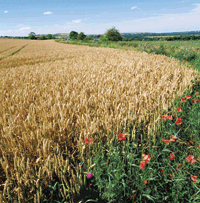Call goes out for thousands to join Campaign for Farmed Environment

Thousands of farmers will this month be urged to join the industry-led campaign to fend off a compulsory set-aside replacement across England.
More than 40,000 letters will be sent to farmers with over 10ha (25 acres) of arable land asking them to join the Campaign for the Farmed Environment. The letters will be dispatched towards the end of January.
The campaign aims to double the take-up of key in-field options under entry level stewardship, retain the current amount of uncropped land and increase voluntary environmental management by at least 30,000 ha (75,000 acres).
Although ambitious, the government has warned that failure to meet these targets could see financial penalties and stringent regulations imposed on farmers in a bid retain the environmental benefits once provided by set-aside.
Campaign co-ordinator Corrina Gibbs said: “Whatever type of farmer you are, the uptake of entry-level stewardship and the right voluntary measures will count towards the campaign succeeding by meeting its targets.”
Some 14,000 entry-level agreements are due to come up for renewal this year. New agreements, which will start from 1 August, will include revised options tailored towards a range of farming and environmental needs.
Natural England is already advising farmers to renew agreements so they don’t miss out on payments. Renewal applications should be submitted at least two months before the expiry date to avoid gaps between old and new agreements.
Robin Tucker, Natural England’s executive director for national delivery, said entry-level stewardship was the most effective tool available for countryside conservation on a broad scale.
“The large number of renewals coming up in 2010 presents a huge opportunity for farmers to support the Campaign for the Farmed Environment and enhance their role as custodians of the rural landscape over the next five years.”
From the beginning of February, farmers will be able to renew agreements online as well as on paper. Online applications are faster and points are automatically calculated as different options are added.
Gareth Morgan, head of agriculture policy at the RSPB said: “The campaign needs as many farmers as possible on board, so getting the message across is vital if we are to make it a success.”
The charity was working with campaign farmers to provide advice on the targeted environmental measures that would boost wildlife on farms, make a difference for farmland birds and halt their decline.
“Skylark and yellowhammer populations will not recover across the country if just a handful of isolated farms create habitats for them – we need seed rich field margins, skylark plots and over-winter stubble across the length and breadth of our farmed countryside.”
